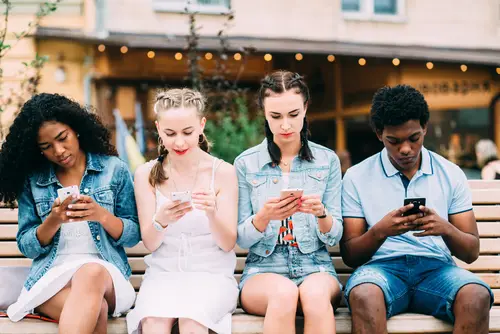
On average, a person spends around 7 hours on screens per day. Instead of studying and spending time with friends and family, one’s eyes are attached to a screen and aren’t living in the moment. Technology is a huge part of today’s world where one can communicate with a press of a button, making communication a lot easier. At first glance, it seems like technology is bringing people closer through easier communication. However that is not the case. When one looks deeper, they will see that technology actually makes people more isolated than ever.
Technology provides the illusion of connection, however it is the complete opposite of this. Platforms such as Instagram and TikTok are designed to bring people together, but these interactions are superficial. Instead of deep and meaningful conversations, one receives a 10 second story of someone’s edited and sometimes unrealistic life. The constant streams of artificial perfection can be detrimental to one’s self esteem. This can have numerous effects on someone such as body image distortion, fear of missing out, and feelings of inadequacy. Anyone can be affected negatively by social media, including students at Yorba Linda High School. Isabel Cho (10) states that she often finds herself “comparing [herself] to influencers on social media” and “[she] has to remind [herself] that it is not real.” Unreal expectations are set which creates a feeling of inadequacy as people compare their unfiltered reality to a perceived perfect life.
Furthermore, virtual communication lacks the body language and facial impressions which can be found in real life communication. The lack of emotional affluence from face-to-face communication can create a sense of disconnection. According to the American Psychological Association, when there is an absence of human interaction, there are a lot of health consequences such as depression and poor sleep quality. The constant use of technology prevents people from making personal connections. When one has free time, they often reach for their cell phone instead of embracing the moment and interacting with others. This can be particularly problematic for younger generations because most grow up around technology and screens. Instead of interacting with people their age, they tend to be attached to a screen, which can have a negative effect on their soft skills in the future.
The overuse of technology can lead to people withdrawing from physical interactions in favor of digital ones. Technology can create a barrier between individuals when in a public space. Unfortunately, it is common to see a group of people sitting together not interacting and instead, staring at their digital screens. The practice of ignoring one’s company in order to pay attention to their device is called phubbing. This highlights how people can be physically present but also emotionally absent, leading to isolation.
Technology has come a long way, for better and for worse. It’s overuse can lead to unintended consequences that fosters isolation. Humans thrive off the genuine connection, empathy, and physical presence an in-person interaction provides. In a world surrounded by technology, it is important to not let it create a barrier and foster isolation.




























Claire Kwon • Oct 24, 2024 at 7:53 AM
This article is so professional and was an amazing read!!